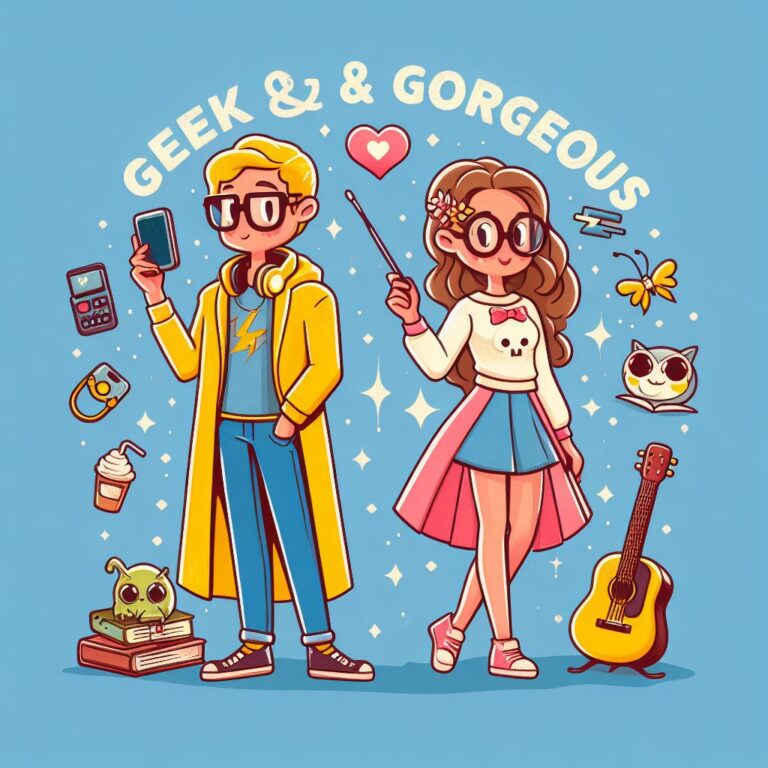How ‘Nerd’ is Expressed and Perceived in Spanish Culture
Diving into the realm of Spanish culture reveals a complex tapestry where intellect and passion intertwine. Unravelling how ‘nerd’ is conveyed in Spanish culture gives insight into the values of the society.
The term ‘nerd’ in Spanish has nuances different from the English counterpart. In English, ‘nerd’ often has a negative meaning; however, in Spanish, it celebrates knowledge and expertise. The word ’empollón’ embodies diligence and intelligence, displaying the importance of learning in Spanish culture.
Additionally, pop culture has impacted the perception of ‘nerds’ in Spanish society. Movies like ‘El día de la bestia’ and TV shows like ‘El Ministerio del Tiempo’ portray nerdy characters as heroes with great knowledge and problem-solving skills. This depiction elevates them to esteemed status within popular imagination, highlighting that intelligence is embraced.
To gain a deeper understanding of nerdiness in Spain, it is essential to experience different settings where this concept thrives. Academic institutions and technology conferences display individuals investing their enthusiasm and time into their area of expertise. Through conversations based on intellectual curiosity and creative ideas, one can observe the community that shapes Spanish nerd culture.
History of the term “nerd”
The word “nerd” has a captivating history, originating in the US. It was first used in the 1950s, and held negative associations – implying someone who was socially clumsy and extremely studious. With time, the meaning of the term has evolved and become more positive.
Initially, being a nerd was an insult. They were thought of as outsiders, absorbed in books and not interested in social activities or popular culture. This negative representation added to the stereotype of nerds being unpopular and uncool.
With the growth of technology and the increasing importance of computer science in the late 20th century, people’s view of nerds changed. As computers became more accessible, people realised the technical knowledge and abilities some nerds had. The once looked down upon features of being intelligent, analytical and meticulous, became important in industries like programming and engineering.
In Spanish culture, although the word “nerd” is not native, it has been adopted. The influence of American TV shows, movies and pop culture on Spanish society has made the concept of nerds familiar. It is interesting to note that there may be slight differences between how the term is understood and seen in Spanish culture and American culture.
The story of the term “nerd” mirrors society’s shifting attitudes towards intelligence and expertise. What was once an insult is now a label that embraces enthusiasm for knowledge and technical skills. In today’s tech-dependent world, being a nerd is something to be proud of for one’s original abilities.
The perception of nerds in Spanish culture
To better understand the perception of nerds in Spanish culture, delve into the stereotypes associated with nerds and the changing attitudes towards them. Explore how these sub-sections shed light on the varied perspectives and societal shifts regarding the concept of “nerd” in Spanish culture.
Stereotypes associated with nerds
In Spain, nerds are usually seen as people who are very dedicated to studying and learning, often viewed as introverted and prioritizing knowledge over socializing. This is due to the importance placed on good grades in academic settings.
Furthermore, Spanish nerds are commonly seen as having poor fashion sense and practicality over style, due to their focus on intellectual pursuits.
It should be noted, however, that these stereotypes do not apply to all Spanish individuals. Like in any other society, there is a large range of personalities among nerds in Spain, and not everyone fits these standards.
Many successful professionals have come from a nerd background. Miguel de Cervantes, a renowned Spanish writer, was renowned for his academic prowess and literary talent, defying the typical socially awkward stereotype of nerds.
This goes to show the variety of perspectives on nerds in Spanish culture, and the need to challenge these preconceived ideas by appreciating the diversity within this group.
Changing attitudes towards nerds
The view of nerds in Spanish culture is changing rapidly. In recent years, respect and admiration for their intelligence and unique interests have grown.
Many causes can explain this transformation. Firstly, tech has become part of our lives, so skills like coding and data analysis are now prized. Nerds, who usually do well in these areas, are now seen as valuable.
Also, popular media has had a big effect. TV shows and movies show nerdy characters as smart, clever, and successful. This accurate portrayal is breaking down stereotypes.
Schools are supporting this trend too. STEM (Science, Technology, Engineering, and Mathematics) courses are now popular. They focus on the topics often associated with nerd culture.
To keep this acceptance of nerds growing, we need to encourage diversity and inclusivity in society. Everyone should be able to express their passions without fear of judgment.
Finally, the successes of accomplished nerds should be shared. This will motivate others to pursue their passions without fear. Showcasing the achievements made through passion and dedication can inspire generations.
Expressions of “nerdiness” in Spanish culture
To explore expressions of “nerdiness” in Spanish culture, dive into the nuances of nerd fashion and style, nerd hobbies and interests, and nerd communities and events. Discover how these elements contribute to the way being a “nerd” is expressed and perceived in Spanish culture.
Nerd fashion and style
Spanish nerds love vintage fashion. They mix old and new pieces to create an eclectic style. Show off your inner nerd with confidence! Geeky T-shirts, glasses as a fashion statement, mismatched socks, and accessorizing with nerd-inspired items are some other unique looks.
Wear references to pop culture, science, or technology on T-shirts. Opt for stylish frames and bold designs for eyewear. Have fun and be quirky by wearing mismatched socks. Incorporate accessories that reflect your interests. Math equation necklaces and comic book character backpacks are popular choices.
Nerd hobbies and interests
Spanish nerds demonstrate tremendous enthusiasm for comic books, collecting rare editions and being engrossed in the prosperous storylines. They also feel joy in exploring virtual worlds and challenging other gamers when playing video games.
Moreover, Japanese animation has a significant effect on nerd culture, with Spanish enthusiasts ardently chasing their beloved anime series and attending conventions. Also, they relish in the reasonable battles of wits when playing board games and engaging in meticulous crafting such as cosplay or model making to express their creativity and focus on the details.
Besides, many Spanish nerds take pride in taking part in fan communities both online and offline. These communities offer a place for fans to exchange conversations and share their admiration for different hobbies and interests. This fellowship creates a feeling of belongingness for people who may have previously felt socially distant due to their special passions.
“Heroes Comic Con Madrid” is a yearly event that draws in thousands of dedicated fans from all around Spain. This occurrence is an indication of the increasing popularity and approval of nerdiness within Spanish society.
Nerd communities and events
Nerd communities have a world of wonders waiting to be discovered! Conventions in various cities provide a hub where nerds can indulge in their hobbies – from comic books to video games. Gaming leagues and tournaments are organized for healthy competition between enthusiasts. Special screenings of cult classics or expected films are held too. Meetups let nerds socialize, exchange ideas and show off their talents – from cosplay to board game nights.
Sometimes exclusive book signings occur and sneak peeks at upcoming releases happen. For example, one event had the premier of a long-awaited sci-fi series. Fans lined up for hours full of anticipation to see the first episode before its official release date. The cast and crew even hosted Q&A sessions – making it a unique experience.
It’s clear that Spanish culture celebrates niche interests and values them. It is a platform for people to connect with others who share the same dedication, and build strong bonds through common experiences.
Influence of technology on nerd culture in Spain
Technology has had a huge impact on nerd culture in Spain. Online gaming communities and forums have brought nerds together, creating a sense of unity. Social media made it easier for nerds to share their passions with more people. Advancements in technology have also opened up new opportunities, like virtual reality gaming and cosplay.
Technology has helped spread nerd culture. YouTube and Twitch let Spanish nerds show off their talents and know-how. This increased the visibility and acceptance of nerd culture.
Technology has also allowed for events and conventions related to nerd culture. There, nerds can meet others with similar interests, compete, and purchase things related to their hobbies. These events create tight-knit communities.
Juan Martinez from Barcelona found a way to express his passion for video games with technology’s influence on nerd culture in Spain. He was labeled “strange” in school, but online communities helped him find acceptance. This support system gave him confidence and inspired him to pursue game development as a career. Technology changed Juan’s life and opened opportunities for him.
This article shows how technology has shaped nerd culture in Spain – from fostering connections and acceptance, to organizing events, even to transforming lives.
Challenges and opportunities for nerds in Spanish society
Nerds in Spanish society face both challenges and opportunities due to varying perceptions. The table below outlines them.
| Challenges | Opportunities |
|---|---|
| Social Stereotyping | Increased demand for tech skills |
| Bullying | Growing acceptance |
| Limited social circle | Niche communities |
Nevertheless, there are unique aspects to how ‘nerdiness’ is seen and used in Spanish culture. Furthermore, the appreciation for academia and intellectual activities creates more chances and issues for nerds.
To assist the assimilation of nerds in Spanish society, here are some tips:
- Promote diversity and inclusion in schools to fight social stereotypes and bullying that nerds often suffer. Inspire students to approve different interests to create a supportive atmosphere.
- Host events about technology and innovation to give nerds the opportunity to demonstrate their skills and link with similar people. These events can include workshops, conferences, or competitions to nurture their gifts.
Moreover, build online platforms or offline clubs around niche interests to form communities where nerds feel accepted and respected. This sense of belonging can reduce the sense of loneliness among nerds and let them make real connections.
By doing these things, Spanish society can create an environment that not only admires academic excellence but also acknowledges the valuable contributions that nerds make in different areas.
Conclusion
In Spanish culture, nerds are no longer just seen as intelligent and studious people–they are also viewed as outsiders. Their hobbies and interests aren’t always considered ‘normal’, leading to their exclusion from mainstream society. But, the perception of nerds is changing! Comic book conventions and superhero movies have helped make certain aspects of nerd culture more accepted. This shows that society is beginning to appreciate and understand intellectual pursuits.
The term “friki” is a slang word used to describe someone who is passionate about a certain subject or hobby, often in an obsessive way. While it used to be an insult, people now embrace being called a friki with pride. The term has taken on more positive associations, which celebrates the uniqueness of individual interests.
Technology has also had a major effect on how nerds express themselves and are perceived in Spanish culture. The internet provides a platform for nerdy communities to connect and grow. Online forums, social media groups, and streaming platforms give nerds an outlet to express themselves without worrying about being judged.
So don’t be afraid to explore your passions and connect with other like-minded people. Be proud of who you are and what you love. The nerd revolution has begun, and it’s time to be part of it!
Frequently Asked Questions
1. How is the term ‘nerd’ expressed in Spanish?
In Spanish, the term ‘nerd’ is often expressed as ’empollón’ or ‘cerebrito’.
2. Is being called a nerd positive or negative in Spanish culture?
Being called a nerd in Spanish culture can carry both positive and negative connotations. It can be seen as a compliment for being intelligent and knowledgeable, but it can also imply someone is overly focused on academics and lacks social skills.
3. Are there any stereotypes associated with nerds in Spanish culture?
Yes, similar to other cultures, there are stereotypes associated with nerds in Spanish culture. They are often portrayed as introverted individuals with a strong interest in academic pursuits, technology, and pop culture.
4. How are nerds perceived in Spanish schools?
In Spanish schools, nerds are generally respected for their intelligence and academic achievements. However, they may also face some social stigma or bullying due to being perceived as different or overly focused on their studies.
5. Are there any specific hobbies or activities associated with nerds in Spanish culture?
In Spanish culture, nerds are often associated with activities such as reading, playing video games, solving puzzles, participating in robotics clubs, and engaging in intellectual debates.
6. How can someone embrace their inner nerd in Spanish culture?
To embrace their inner nerd in Spanish culture, individuals can join academic clubs, attend comic book conventions, participate in geek culture events, and openly share their passions for intellectual pursuits without fear of judgment.
- The Dinosaur T-Rex Running Game - 5 November 2023
- Simon Says Remember: The Classic Simon Electronic Game - 5 November 2023
- AppleCare Cancelled? Now What? - 4 November 2023







